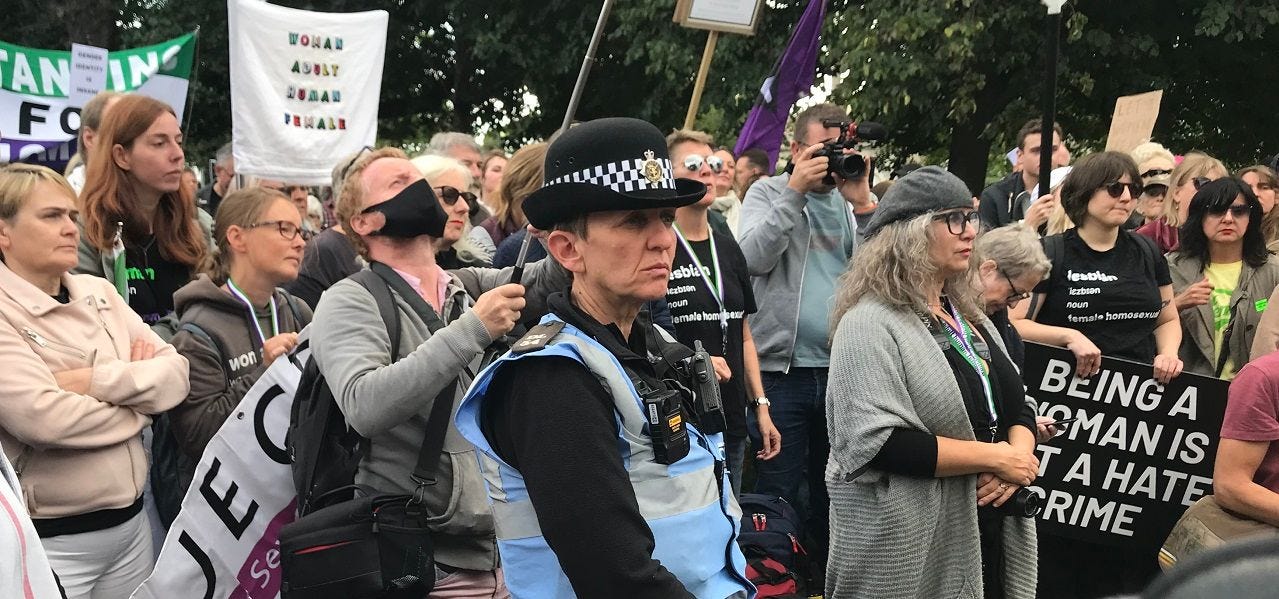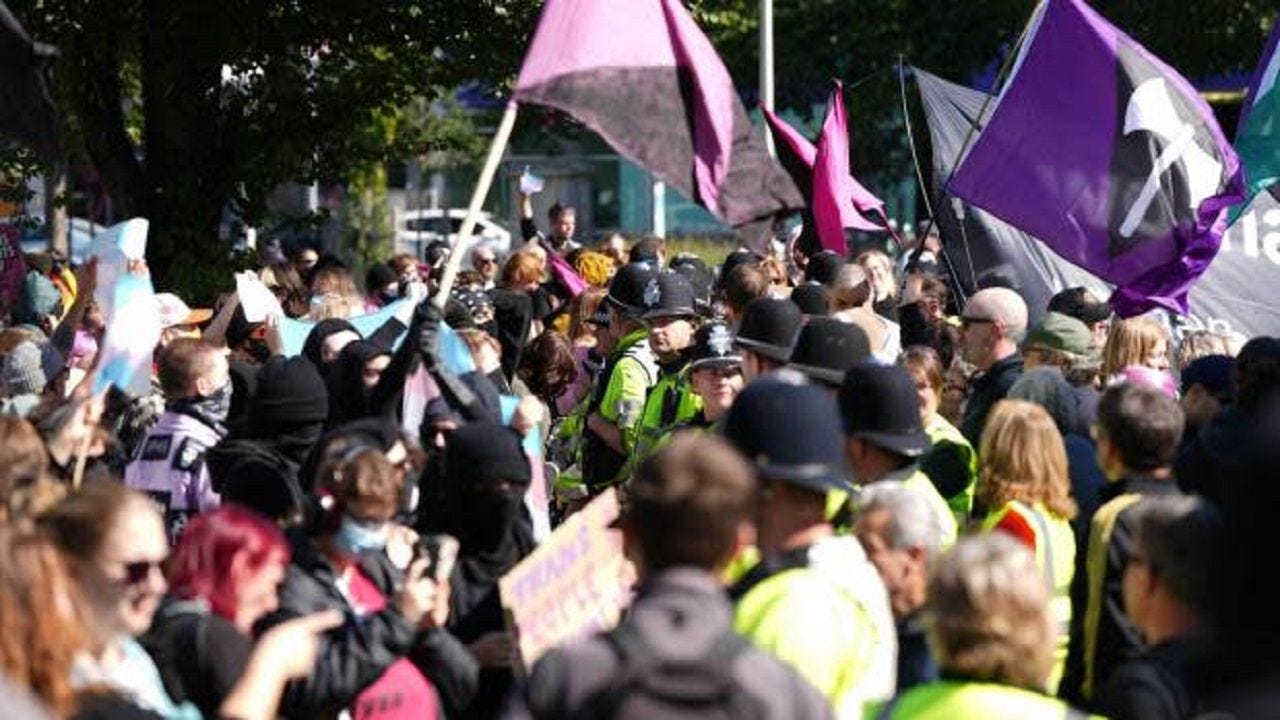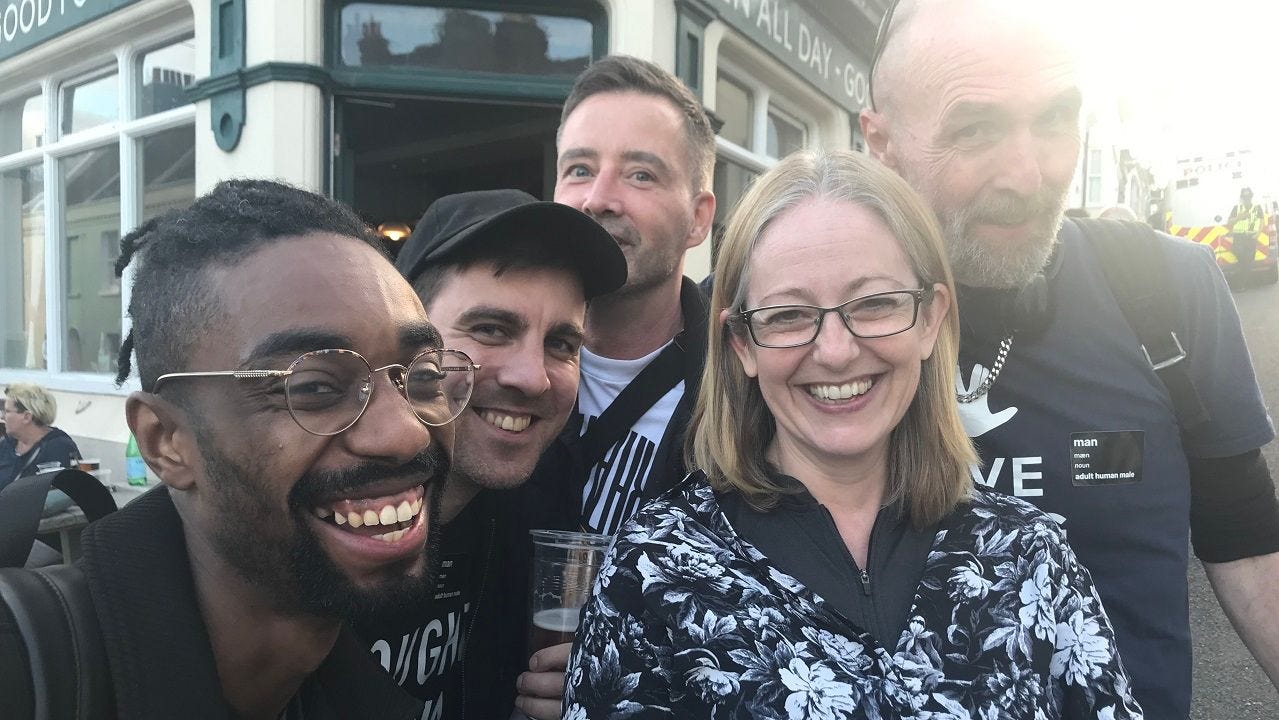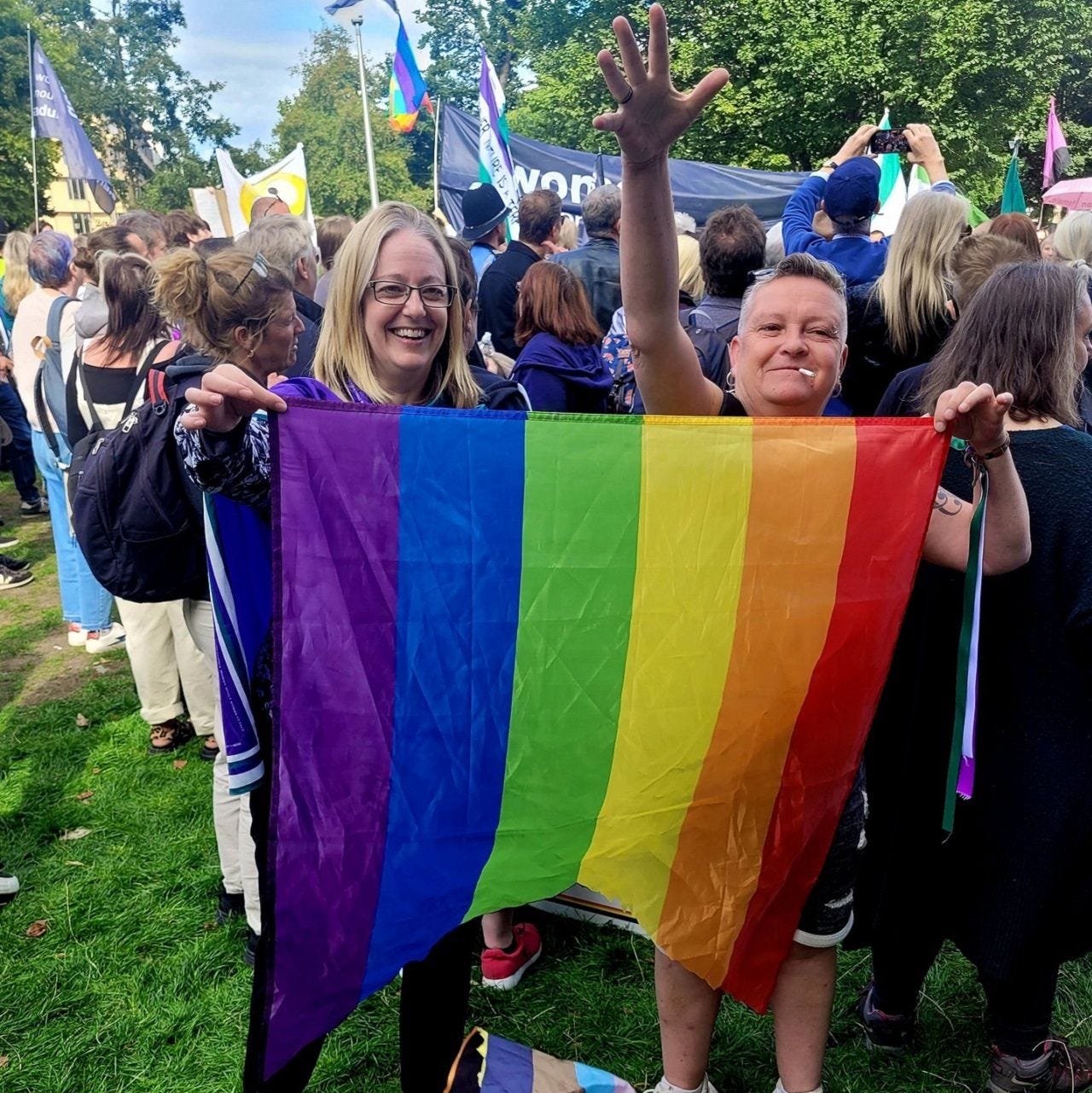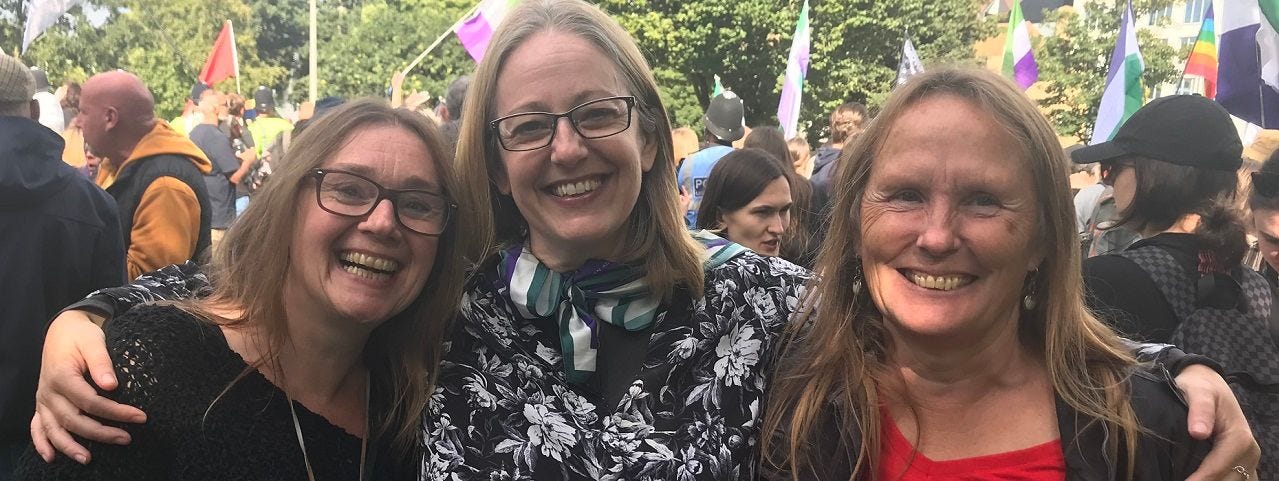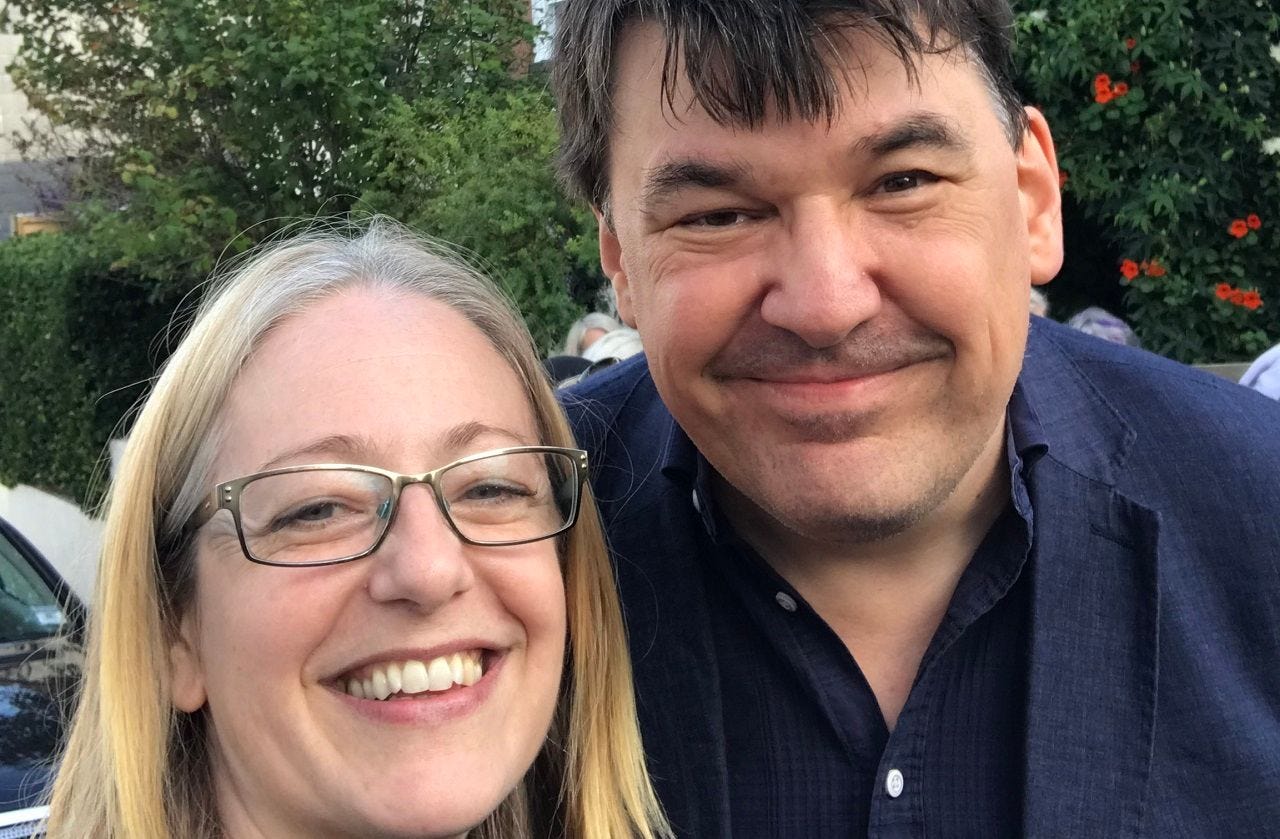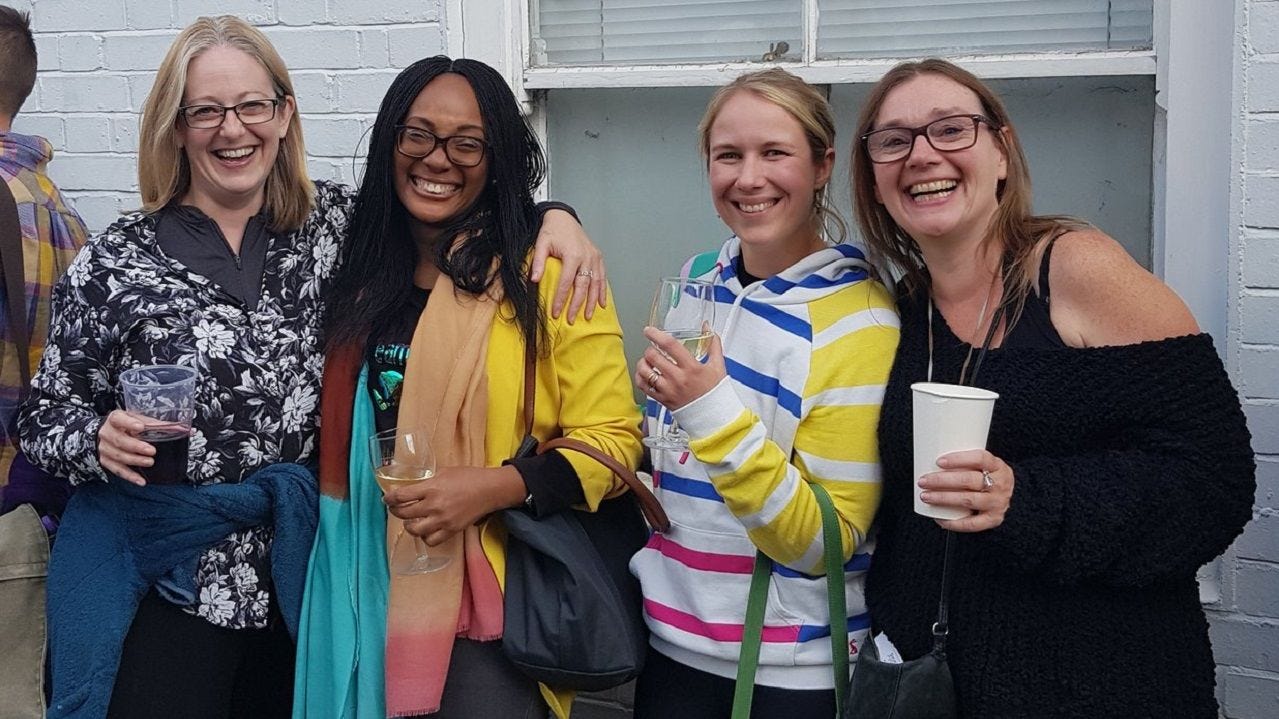Standing for Women in Brighton
Going to a relly organised by Kellie-Jay Keen, aka Posie Parker, provoked a lot of criticism from people I like and respect—some of it in public, some through back channels
Last weekend, I went to Brighton to attend the Standing For Women rally organised by Kellie-Jay Keen, aka Posie Parker. I’ve intended to go to one of these several times, only to be frustrated by badly timed illnesses, appointments or travel. So I was pleased to make this one, which had something of a “belly of the beast” feel to it. (For American readers, Brighton is the nearest Britain has to San Francisco).
I didn’t find it difficult to decide to go, but doing so has provoked a lot of criticism from people I like and respect—some of it in public, some through back channels. Many of the women on the same side as me in the gender wars disapprove strongly of Posie. Some try to convince their fellow-travellers to stay away from her, and her events. As complaints and criticisms continue, I’ve struggled to write this newsletter—indeed, I’ve written and deleted many thousands of words. That’s why it’s a bit late, for which apologies.
First, I’ll tell you a bit about what it was like. Posie’s events all follow the same pattern: stake out a patch of ground, set up an amp (small, totally inadequate if there’s a protest) and let any woman who wants take the mic. This time, there was a protest, and it was noisy. Among the protesters was a fair contingent of black-clad masked men, some with large trans flags and some with what some Googling revealed was the “Queer Anarchist” flag (it’s the pink and black one). They threw smoke bombs—one went off right next to Maya Forstater as she spoke—and glitter bombs—Aja, one of the Let Women Speak stewards, caught the force of one in her dreadlocks. But mostly they just blew foghorns and the like, and chanted slogans (trans women are women; All TERFs are cunts; that sort of thing; my favourite counter-chant was: Your mum’s a TERF).
The policing was so-so. It was much worse than at the Lesbian Strength rally the previous day in Leeds, where barriers kept the protesters back and meant the speakers could be heard. But it was a lot better than at the previous Let Women Speak rally in Bristol, where some women were assaulted while police stood by. In Brighton the officers did try to keep the protesters behind a line, and mostly succeeded.
But that line was located right next to where women were speaking, meaning that the threat felt constant and it was impossible for attendees to hear a word unless they were in the tight circle around the speaker. A steward told me she had pleaded with officers to move the line back a little, only to be told that the protesters, too, were “exercising their free speech”. What nonsense: what they were exercising was the “heckler’s veto”.
The point of the day, however, was not so much what was said—mostly variations on “men can’t be women”, I assume—but the fact that so many people turned up to insist on being able to say it, out loud, in public. And so instead of trying in vain to hear, I circulated, chatted and took pictures. The conversations alone made it well worth going. It was heartening to meet so many young people who dissent from their peer group’s orthodoxy on gender, even if most felt unable to say so anywhere else. There were a fair few men, too—gay men of all ages, and some husbands and fathers.
For many, the day seemed to be a celebration: a chance to mingle with like-minded types, with the mob chanting and flag-waving only increasing the jollity. But there were also a lot of sad stories—surely many more than I got to hear. Here are three vignettes, stripped of identifying details and lightly disguised.
A teacher, I’d guess in her late 50s, told me how she lost her job after a single PSHE (personal, social, health and economic) lesson. She had been asked at short notice to cover for a colleague’s absence, but given no instructions beyond “talk about sex, gender and sexuality”. And so she did—from the point of view of a science teacher, and a long-time lesbian feminist campaigner. Afterwards a pupil reported her for “misgendering” (if I remember aright, of Caitlin Jenner); her contract was terminated (she had only recently started work at that school and so had minimal employment protection); and she is now scraping by on supply work.
A woman who had travelled from the continent especially to attend told me that her son, a socially awkward young man who had already been too-online before the pandemic, was now identifying not just as a woman, but as an anime avatar. They had managed to persuade him to stop taking oestrogen by telling him about the health risks, but he is no longer speaking to them at all. She said she has become convinced that there is a new type of gender dysphoria among men, mediated by internet activity—immersive games in which you can choose your personal characteristics; ubiquitous and ever-weirder porn; chatrooms and social-media sites where other users seem to like you better if you have a special identity. I’m sure she’s right.
And finally, for me the most upsetting: a friend told me that she is being investigated at work after an anonymous whistleblower made a complaint to HR. The complaint was her link to me.
Which brings me to the effort to get me and everyone deemed amenable to social pressure to cut Posie off. It feels painfully familiar—from the side that Posie’s on. Because I’m also someone whom people endlessly try to cast out of the circle of acceptability. And when they fail on one ground, they move on to another.
I had already suffered significant social consequences by the time my book came out. To pick a single example, the first agent who considered representing me changed her mind, saying that she had realised she was uncomfortable staking out strong positions and preferred to “sit on the fence”. I have no proof, but I think she belatedly understood what representing me would mean in her social circle. She also represents a pretty well-known man who likes to pop up every now and then on social media to berate gender-critical women for being big meanies, and feared losing him.
Since publication, the attempts to get all right-minded people to shun me have come in waves. The first was based on the claim that I, and the book, are antisemitic—an absurd claim I had to debunk. Next came the claim that I am genocidal. The latest smear, that I am racist, seizes on a picture taken at the Brighton event. Soon after arriving I met my friend Jo Campbell, a lesbian activist, who showed me a Progress Pride flag she had chopped up to remove the chevrons added to the original rainbow. These chevrons represent the Black Lives Matters movement (not black people, who are already in the rainbow if they’re gay), trans ideology (not trans people—also already included if they’re gay) and, depending on the version you use, “intersex” people (DSDs are medical conditions, not identities, and people with DSDs are already included if…you get the idea).
This photo is being interpreted as two white supremacists defacing a flag (for crying out loud, white supremacists?? And Jo would argue that it is the intrusion of these ideological elements into a flag that already represents every same-sex-attracted person that is the defacement). Jo waving at a friend is supposedly a Nazi salute. I’ve even seen claims that we stole the flag from a protester (it’s Jo’s, she brought it with her, already in two pieces, and is planning to add Velcro to the two sides so she can in future make her point more theatrically).
The issue isn’t merely that these specific allegations are invented; it’s that the specifics aren’t the point. The people who hate me and want others to shun me are looking for any mud they can throw at someone they have already declared a target. The mud didn’t make up their minds; their minds were already made up. And there’s actually nothing I could do to change their minds: apologising for whatever latest load of nonsense they’ve invented would just spur them to new heights.
I don’t think the people attacking Posie are anything like as malicious. In fact, what’s killing me is that some are my friends. But all the same I think the dynamics are very similar. And I think that, even though some of her decisions merit criticism.
The shunning of Posie started in earnest in 2018 when Woman’s Place UK, a group of socialist feminists within the Labour Party which was set up to campaign against gender self-ID, withdrew from an event at which they had invited her to speak. They later explained in more detail that they did so because of some tweets (Posie has since been kicked off Twitter).
I can see why they did this: they’re an ideologically cohesive group with strong shared principles, and a constant, keen awareness of how they look within the broader Labour movement, which after the recent identitarian turn is largely hostile to them. All the same, I don’t think they should have. The bar for disinviting someone publicly should be far higher than for inviting them in the first place. It would have been totally fine for WPUK to decide Posie wasn’t their cup of tea; but once they had said publicly she was speaking at one of their events they should have stuck with that barring truly exceptional new information. I don’t think her tweets came anywhere close to that standard.
When you deplatform someone like this, it’s a public humiliation. I think this public humiliation of Posie is the single biggest cause of ill-feeling that bubbles under the surface within the varied and fractious “GC movement”, occasionally, as now, bursting out. It goes a long way to explain why so many women who admire Posie for giving ordinary people a voice feel so hostile towards what they often call “academic” or “professional” feminists.
I don’t think this hostility is particularly accurate or fair. I think these “academic” and “professional” feminists have done brilliant work and in many cases suffered a great deal. It will take a wide range of skills and approaches to bring down trans ideology, including papers and academic conferences, political caucuses and party motions—and marches and rallies.
But I also don’t think the hostility is entirely baseless. It’s not just a bitter history; it’s a fundamental difference in world views. Some of those who criticise Posie feel strongly that we cannot defeat trans ideology except with a socialist-feminist analysis—and it’s their right to hold that position, and to argue for it as vociferously as they like. But very few people are socialist feminists. You can of course dislike the sentiments Posie’s tweets expressed, and I know that the women of WPUK did. But they are pretty mainstream—much more so than socialist feminism.
It’s perfectly possible to defend Muslim women’s rights to dress as they wish; to cover or not cover, but still disapprove strongly of the covering of little girls. As for Pakistani Muslim grooming gangs, it is now unarguable that they operated in many English towns for many years with near impunity—and that was in part because of the perpetrators’ ethnicity and religion.
Police and social services looked the other way as underage girls were groomed, raped and prostituted in part because they feared being called racist, and in part because they regarded the victims—disproportionately working-class white girls, many living in care or in households where the father was absent—as dispensable. And most journalists looked the other way for similar reasons. The team at the Times (of London) which broke the story was smeared by other outlets (the Guardian was especially vicious) and campaigners (in particular Hacked Off): here’s a taste of what the Times’ chief investigative reporter, Andrew Norfolk, was subjected to. Sue Berelowitz, then the Deputy Children’s Commissioner, accused the Times of “prejudice and stereotyping”, saying it was pandering to the far right and fixated on Asian perpetrators.
Addendum, added September 28th 2022: After this article was published journalist Julie Bindel dropped me a note to tell me something I hadn’t known: she was the first journalist to expose the child-grooming scandals, and had been trying to get stories about the grooming scandals into papers for ages before the Sunday Times finally took one (among the papers too worried about being labelled Islamophobic was the Guardian, by the way). It was after her piece that Andrew Norfolk took up the thread and did a great deal of excellent reporting. Julie tells me she is working on a podcast about it all, which is sure to be excellent. I’ll share once it’s released.
It’s impossible to overstate how much harm was done by this selective blindness: how it harmed race relations; how it damaged trust in the police, social services and the media; how it sowed suspicion of leftwing institutions among centrists and right-leaning voters; how it turbo-charged ethno-nationalist groups. I think many more British people would now think Posie’s tweets perfectly defensible, indeed necessary, than would have before the revelation of that widespread institutional failure.
The criticisms of the event on Sunday did not, by and large, hark back to that rupture. Rather they centred on who else was there: Sophie Corcoran, a trenchantly right-wing presenter for GB News; Andy Ngo, a right-wing chronicler of the excesses of Antifa; and two men from Hearts of Oak, a hard-right groupuscule. Formed relatively recently, it is centred on Tommy Robinson (aka Stephen Yaxley-Lennon) and Sargon of Akkad (aka Carl Benjamin), a pair of free-speech warriors whose main exercise of free speech concerns the alleged awfulness of Islam. The men from Hearts of Oak livestreamed the event from a pretty good vantage point, suggesting that even though many attendees (myself included) didn’t know they were there at the time, Posie may have.
I haven’t talked to Posie about these criticisms. But I think most of those making them had already decided she was beyond the pale, and she had already decided she didn’t care. If you publicly shame someone for harshly worded but defensible tweets, you can’t expect them to listen to you when you make more firmly founded criticisms, because you can’t say: “look, I know we disagree on many things, but a line must be drawn and surely Hearts of Oak is on the wrong side of it?” Posie knows that a line was drawn well before the event in Brighton, and she was already on the wrong side. I can’t see any reason to think that, if she were to apologise for the presence of Hearts of Oak, she would be welcomed back into the fold. I also doubt she even wants that.
For my part, I do think a line needs to be drawn, with Hearts of Oak on the wrong side of it. (I should also point out that the Brighton rally was in a public place, and the organisers had no power to turn anyone away.) But I have no intention of denouncing either Corcoran or Ngo. Apart from anything else, it would be hypocritical of me. I appear on GB News, where Corcoran is a presenter, whenever I’m invited, and I’ve written several times for Quillette, where until recently Ngo was a contributing editor. In other words, I had already accepted sharing a platform with both well before Sunday’s event.
And I don’t regret that, either. Quillette took my first long read about the harms of trans ideology when no mainstream publication would. As for going on GB News, I appear to be blacklisted from all mainstream television channels. And anyway—those mainstream publications and television channels platform people with opinions and attitudes I despise, like Owen Jones and India Willoughby. Should I fret about being “co-platformed” with them? I enjoy talking to Andrew Doyle on his GB News programme “Free Speech Nation”, and find it genuinely more congenial than I would find going on BBC Woman’s Hour, which ignored my book but found time to talk to Grace Lavery about his “Please Miss: A Heartbreaking Work of Staggering Penis”.
This is a sad, grumpy issue of my newsletter, I’m afraid! I don’t know quite how to wrap it up, except to say that I don’t buy Posie’s “the house is burning down; the children are inside; I’ll work with anyone who can help get them out and we can discuss our differences later.” I think there are people it’s not worth working with, even in this dire emergency. But I’m not going to join in denunciations that purport to be about the event in Brighton, but in reality long predated it.
PS: I feel too down to end like that, so here are a few more happy photos of what was genuinely an amazing day.



